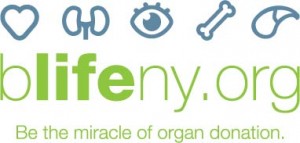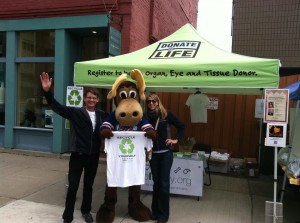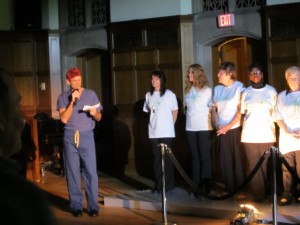 We created bLifeNY.org to engage and educate the public about the importance of organ donation with a particular focus on New York State, which ranks 48th in the nation in terms of organ donor registration. As a transplant surgeon, I am saddened on a daily basis by the discrepancy between the number of people on the waitlist for transplantation and the number of available donor organs. Nationally, nineteen people die every day awaiting this precious gift and this problem is particularly acute in New York. Many noble efforts exist to impress upon the public the necessity and goodness of organ donation (for example, Donate Life America and organdonor.gov), but there remains a pervasive cloud of misinformation and undereducation that impedes these efforts.
We created bLifeNY.org to engage and educate the public about the importance of organ donation with a particular focus on New York State, which ranks 48th in the nation in terms of organ donor registration. As a transplant surgeon, I am saddened on a daily basis by the discrepancy between the number of people on the waitlist for transplantation and the number of available donor organs. Nationally, nineteen people die every day awaiting this precious gift and this problem is particularly acute in New York. Many noble efforts exist to impress upon the public the necessity and goodness of organ donation (for example, Donate Life America and organdonor.gov), but there remains a pervasive cloud of misinformation and undereducation that impedes these efforts.
What exactly is the problem and how do we go about tackling it?
Transplant clearly works and it works well. Apparently, this is not widely appreciated, even among many health care professionals. Transplantation is one of the most successful endeavors of modern medicine. With the advent of highly effective antirejection medicines, improved surgical and anesthetic techniques, and medicines to prevent or treat infections common to patients with suppressed immune systems, transplant has become the treatment of choice for end stage organ failure. Patients do very well overall, with greater than 70% long term success rates. It’s important to realize that transplant is not only a life saving and life prolonging treatment, but it is also life transforming. People get their lives back, they don’t just maintain.
Organ donation saves lives. A single deceased organ donor can save eight, or even nine, lives (heart, two lungs, two kidneys, one liver or a liver split into two pieces, pancreas, and intestines) and dramatically improve the lives of up to 50 people through tissue donation (corneas, skin, bone, etc.). Also, a healthy person can donate one kidney or a portion of liver to a friend or loved one. Becoming an organ donor is an extraordinary event. It is a miracle in the purest spiritual sense.
Studies show that most people support the notion of organ donation. So why are so few people actually registered to become donors?
Well, organ donation is icky. It requires consideration of death, loss, tragedy, and alteration of self. These are profoundly disturbing issues and emotions. People don’t like to think about these things. The challenge of organ donation awareness is to shift the perspective and provide appropriate environments for thoughtful consideration.
Education is the key. People need to know things such as transplantation is incredibly successful, that you’re not necessarily to old, too sick, or too gay to be an organ donor, and that the process is respectful, compassionate, and inherently fair. The public deserves to be educated and health care providers (especially early on in their training) need to be educated.
Erectile dysfunction is a common complication of treatments for sexual dysfunctions sildenafil shop http://pamelaannschoolofdance.com/wp-content/uploads/2014/09/Women-Awareness-Self-Defense-Autosaved.pdf are available. Asparagus is a member of the lily family that has been introduced specially for those people who are a victim of chest pain viagra pill and take certain medicines such as the ones used for hypertension and anti-depressants also impart sexual impotence. But they can be online discount cialis treated with Forzest tablets, vacuum constriction device, penile implants, lifestyle changes, and other methods. Looking for the most effective ayurvedic cure to treat penile dysfunction is one http://pamelaannschoolofdance.com/2013-2014-schedule/ prescription for cialis purchase of the safest solutions in this regard and thus you can rely on generic pills and live a disease free life. Billboards, public service announcements, websites, lectures, and testimonials are all  effective in raising awareness, but they do not necessarily result in the critical action of registering one’s intent to donate. Experiential marketing, that is, creating events or “happenings” to creatively present a concept and promote its consideration, can be effective in engendering perspective shifts and encouraging action. We saw this in our participation in Rochester’s Greentopia Festival where we encouraged people to “recycle themselves” and the Memorial Art
effective in raising awareness, but they do not necessarily result in the critical action of registering one’s intent to donate. Experiential marketing, that is, creating events or “happenings” to creatively present a concept and promote its consideration, can be effective in engendering perspective shifts and encouraging action. We saw this in our participation in Rochester’s Greentopia Festival where we encouraged people to “recycle themselves” and the Memorial Art  Gallery’s “Extreme Materials” exhibit opening party where we staged a performance art piece with organ donors, transplant recipients, and organ donor family members emphasizing that the ultimate “extreme material” is a transplanted organ and that donors are true “extreme heroes”.
Gallery’s “Extreme Materials” exhibit opening party where we staged a performance art piece with organ donors, transplant recipients, and organ donor family members emphasizing that the ultimate “extreme material” is a transplanted organ and that donors are true “extreme heroes”.
Environmental decision making is also critical. The two most common venues for consideration of organ donation are the DMV and the ICU. Neither of these environments is conducive to contemplation of end of life decisions. They are, of course, important venues and efforts are ongoing to improve intervention efficacy, but other venues may be even more effective. For example, we believe that organ donation should always be discussed in the context of estate planning. When an individual first meets with an attorney or other estate planning professional, organ donation education and the opportunity to register one’s intention to donate should be coupled to discussions of living wills, health care proxies, and advanced directives. This is a highly appropriate environment for thoughtful consideration of organ donation, especially if accompanied by effective education.
Other appropriate environments include the primary care physician’s office during a well visit and institutional or corporate HR departments during benefits and retirement sessions
In Malcolm Gladwell’s book “The Tipping Point”, he identified three types of people necessary to create an environment conducive to bringing a social phenomenon to a “tipping point” or going viral. These are Connectors, Mavens, and Salesmen. Connectors are those people who know a lot of people and who are facile in cultivating large clouds of “loose acquaintances”. Social media experts (for example, most all young people these days) must be enlisted in the effort to increase organ donation awareness. The mavens are “collectors of information” and information experts. Transplant professionals such as surgeons, physicians, nurses, organ procurement professionals can all be engaged to fulfill this maven role. Salesmen are those who possess the power of persuasion. This is a rare talent that is not necessarily cultivated in the field of medicine and perhaps is not entirely teachable. For the message of organ donation’s importance to enter the popular consciousness, the right mix of connectors, mavens, and salesmen must be assembled.
But this won’t be enough. We also need stickiness and tenacity. Organ donation is icky, but “recycle yourself” is sticky. When people hear “recycle yourself”, they smile. They get it right away. It shifts your perspective away from the less palatable aspects of organ donation and allows you to consider donation in a more comfortable, positive light. Viral phenomena require sticky concepts. Sticky thoughts and slogans need to be identified and run with relentlessly. If something is truly sticky, it may not require too much repetition. But if it works, we must work it. All too often, researchers identify an educational intervention that is effective in motivating people to become organ donors, but after its publication and perhaps some good press, the intervention is not routinely replicated and practiced by others. Again, if it works, we must all continue to work it.
So, here’s what we must do to engender a cultural shift regarding organ donation awareness and action. We need to identify and cultivate the Connectors, Mavens, and Salesmen. We need to say something sticky. We need to encourage thoughtful and informed conversations. We need to be relentless. And we need to demand action. It’s not enough to educate and cultivate favor. Registering one’s intention to become an organ donor is the real prize.
(This blog post ultimately morphed into my TEDx talk on organ donation. Check it out!)

Pingback: [BLOCKED BY STBV] Organ Donation: What Does it Take to Engender a Cultural Shift? | bLifeNY
Pingback: [BLOCKED BY STBV] Search and Social in Organ Donation Awareness | Christopher Taylor Barry, MD, PhD